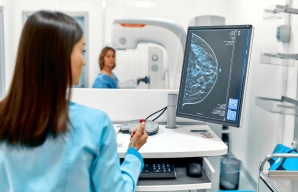Annual Mammograms Save Lives
From an interview with
Dr. W. Shawn Conwell
Carolina Radiology Associates
Breast cancer is the number one cancer treated at McLeod Health each year, according to McLeod Radiologist Dr. Shawn Conwell.
“Numerous studies have shown that when breast cancer is diagnosed early, it has a cure rate of greater than 90 percent,” says Dr. Conwell. “Yearly screening mammograms can help to detect breast cancer at an earlier stage, when it is very treatable. Mammography is one of the most important techniques that physicians use to detect breast cancer. A large benefit of a mammogram is its ability to detect problem areas, even before they can be felt.”
How do I prepare for a mammogram?
The following suggestions can be helpful as you get ready for your mammogram:
- If you’ve had mammograms at another facility, try to get those records to bring with you to the new facility (or have them sent there) so the old pictures can be compared to the new ones.
- Schedule your mammogram for when your breasts aren’t likely to be tender or swollen, to help reduce discomfort and get clear pictures.
- Try to avoid having your mammogram the week just before your period.
- On the day of the exam, don’t apply deodorant, antiperspirant, powders, lotions, creams, or perfumes under your arms or under your breasts. Some of these toiletries contain substances that can show up on the x-ray as white spots.
- You might find it easier to wear a skirt or pants to your mammogram, so that you’ll only need to remove your top and bra for the mammogram.
Finding breast cancer earlier means much lower levels of lymph node involvement and that more women being treated for cancer are eligible for breast conservation. All women ages 40 and over are encouraged to schedule an annual mammogram.
To schedule a mammogram at one of our hospitals, please call 843-777-2095. To learn more, speak with a radiologist near you.
-
McLEOD REGIONAL MEDICAL CENTER FLORENCE
843-777-2000 -
McLEOD DARLINGTON
843-777-1100 -
McLEOD DILLON
843-774-4111 -
McLEOD LORIS
843-716-7000 -
McLEOD SEACOAST
843-390-8100 -
McLEOD CHERAW
843-537-7881 -
McLEOD CLARENDON
803-433-3000



-
McLEOD REGIONAL MEDICAL CENTER FLORENCE
843-777-2000 -
McLEOD DARLINGTON
843-777-1100 -
McLEOD DILLON
843-774-4111 -
McLEOD LORIS
843-716-7000 -
McLEOD SEACOAST
843-390-8100 -
McLEOD CHERAW
843-537-7881 -
McLEOD CLARENDON
803-433-3000
 Find a Doctor
Find a Doctor  Locations
Locations  Services
Services 